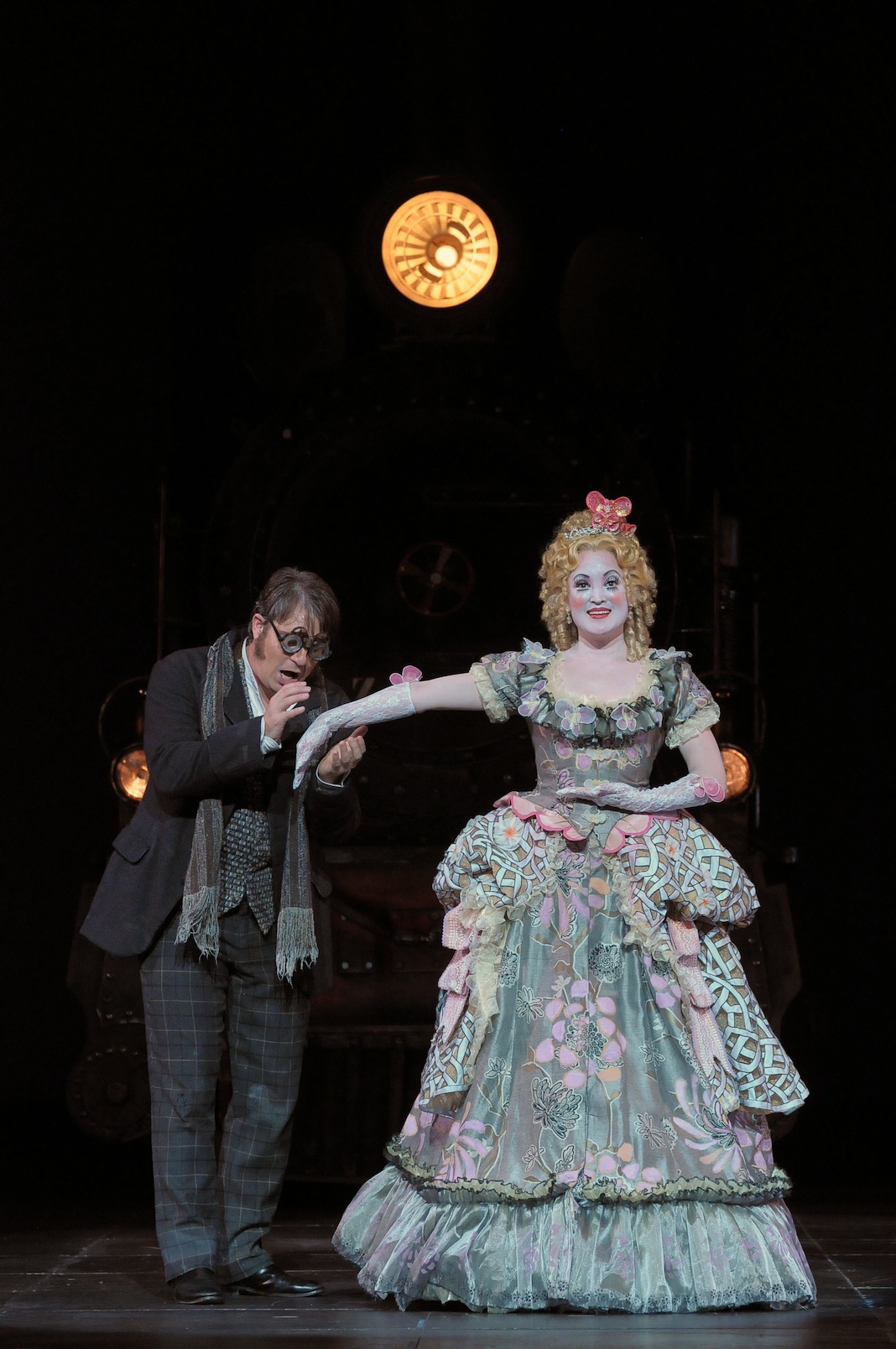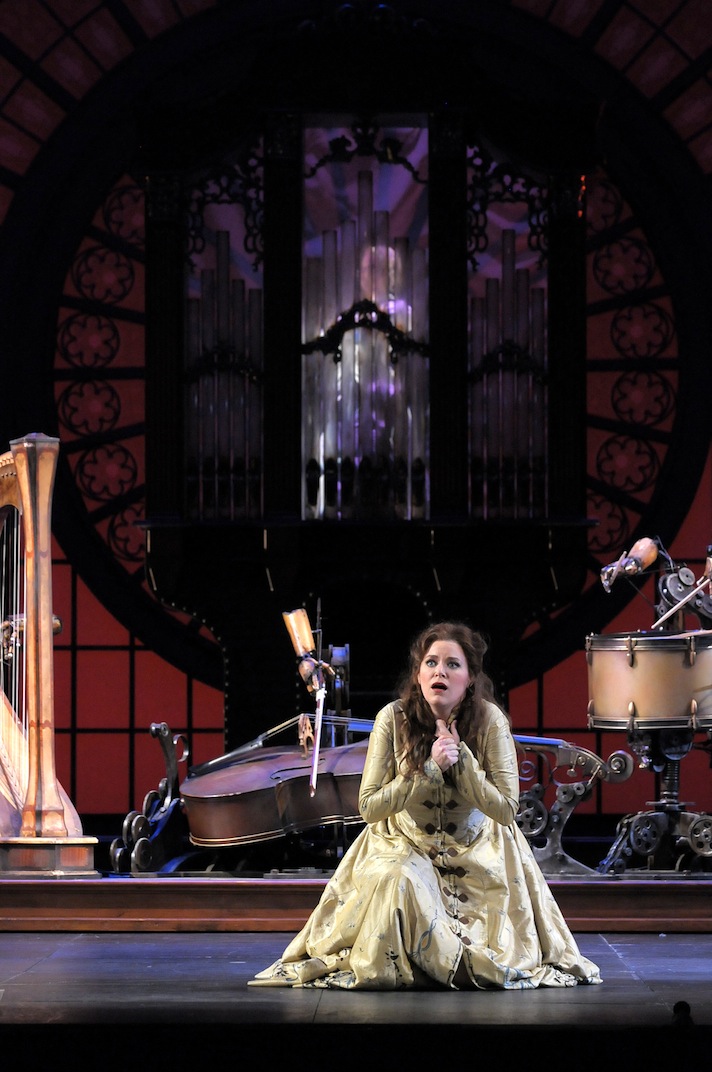Inspired cast sparks a worthy “Hoffmann” to open the Lyric Opera season

The Lyric Opera of Chicago opened its 57th season Saturday night with The Tales of Hoffmann, the company’s first production of Offenbach’s Opera fantastique in 29 years.
This opening night was significant for other reasons as well, besides the usual pre-performance fete and post-performance gala ball, attended by well-heeled first-nighters in their finery. On Saturday, Anthony Freud officially took the reins as the company’s new general director, succeeding William Mason.
Adapted from the stories of E.T.A. Hoffmann, Offenbach’s musical setting tells of the dissipated title poet and his sequential stories of his love for three women—by turns, broadly comic, tragic and bittersweet. Offenbach died before completing his opera, and the score exists in a bewildering variety of options with some music composed by other hands. The Lyric, oddly, elected to go with the old Choudens edition rather than Michael Kaye’s more scrupulous critical edition.
While Nicholas Joel’s production proved something of a mixed blessing, the large cast was superb across the board, making for a vocally resplendent performance that made up for the evening’s fitful directorial lapses.
In his role debut, Matthew Polenzani proved an eminently inspired Hoffmann. The Ryan Opera Center alum possesses a vibrant and penetrating tenor, elegant of tone with reserves of power. His voice is ideal for this Gallic repertoire, and Polenzani sang throughout the long evening with fine French diction and clarion top notes. Dramatically, his Hoffmann was of a darker cast than usual, less in synch with the comedy than the character’s more tragic and depressive side, which suits the downbeat production.
Anna Christy was a clear audience hit as Hoffmann’s first inamorata, the mechanical doll, Olympia. Gliding across the floor, and assaying a variety of intricate mechanized movements, Christy was genuinely funny and vocally delightful, her high soprano vaulting through the doll’s stratospheric coloratura.

The high point of the performance came with Act 2 (often the case since it contains the opera’s best music). As the ill-fated Antonia, Erin Wall delivered the finest singing of the evening with sensitive, rich-toned, and expressively detailed vocalism. As Hoffmann’s second lover whose inherited illness prevents her from singing, Wall was desperately ardent in her duets with Polenzani and heart-breaking in the scene’s tragic coda.
While not etching as vivid a characterization as her two female costars, Alyson Cambridge made an admirable Lyric debut as the courtesan Giulietta, some uneven projection apart.
James Morris’s voice is undeniably worn around the edges, but the veteran bass was wonderfully characterful as the four villains, employing an imposing evil laugh, underlining the Mephistophelian element of the calculating Lindorf as well as the more chilling menace of Dr. Miracle.
Emily Fons, a second-year Ryan Opera Center member, showed striking maturity as the Muse/Nicklausse, singing with an elegant mezzo tone–well earning Nicklausse’s often-cut violin aria— and consistently alive to the comedy as Hoffmann’s confidante.
It was luxury casting to have the big-voiced bass-baritone Christian Van Horn as Antonia’s father, Crespel. As the various valets/henchmen the vestpocket Rodell Rosel made the most of his comic moments, notably Frantz’s little aria. And the remarkable David Cangelosi etched yet another vivid and strongly sung characterization as the goofy scientist, Spalanzani.
Ezio Frigerio’s unit set is a towering structure with side elevators, suggestive of La Bello Epoque in its mix of the Gare Saint-Lazare train station—a little locomotive emerges in Act 1— and the base of the Eiffel Tower. Still, while evocative enough, the structure had little to do with the actual settings for each act. And for as colorful and kaleidoscopic an opera as Hoffmann, the gray-green scaffolding made for a pretty drab and monotonous visual over three and a half hours.
Stephane Roche’s direction was efficient with some decided oddities. The humor of Act 1 could have used a lighter, more imaginative touch and the high-kicking of the men’s chorus in the tavern-less tavern scene was comic in a different way than was likely intended. Blocking was fitfully awkward with characters often hidden from view. The strangest conceit was framing the opera with the drunken Hoffmann being discovered under what looked like cardboard sheets at the beginning of the opera and covered with the same sheets by the Muse at the end.
The chorus sang solidly under interim chorus master Michael Black, though not with the polish and seamless blending Chicago audiences have come to expect.
Emmanuel Villaume conducted the Lyric Opera Orchestra with immense vigor and panache, also showing an impressive bass-baritone in contributing the offstage voice in Act 1.
The Tales of Hoffmann runs through October 29. lyricopera.org; 312-332-2244
Posted in Performances




